Recumbent Exercise Bike vs Spin Bike: Which Is Better?
Author:
Unlock your full potential by engaging with our experts and community! Have questions about your fitness journey or looking for expert advice on weightlifting techniques? Don’t hesitate — leave a comment below and Ihor Shymechko will provide a personalized answer and insights to help you reach your goals.
Torokhtiy is reader-supported. Some links are affiliate links, and we may earn a commission at no extra cost to you. See our disclosure page for details.
A recumbent exercise bike or spin bike are both great options that have their own respective pros and cons. In this article, we will take a look at the highs and lows of both and compare a recumbent bike vs a spin bike to help you choose the best option for your fitness goals.
Recumbent Bike vs Spin Bike – It depends on your individual fitness preferences. While recumbent bikes provide a comfortable, low-impact workout, spin bikes offer a more challenging, high-intensity workout. You have to consider your needs and choose the bike that goes according to your fitness goals.
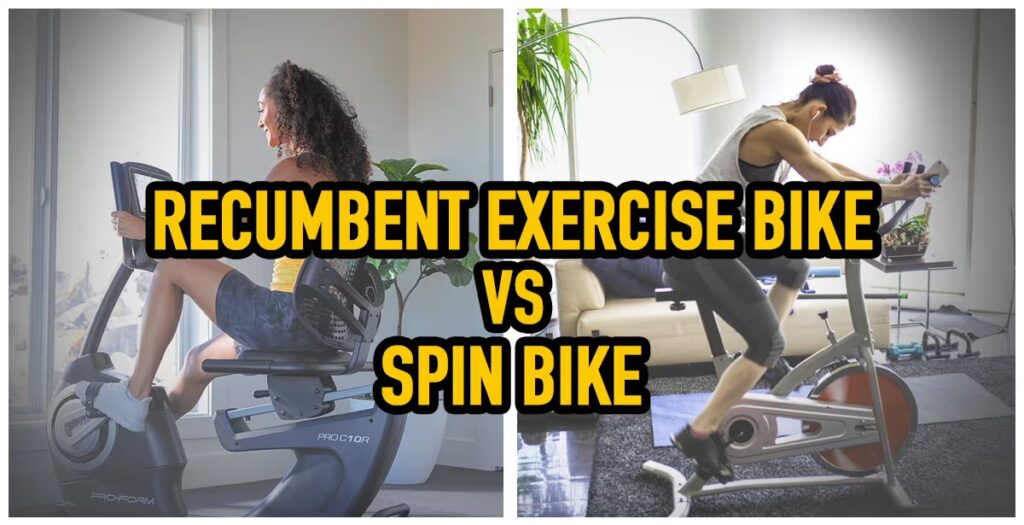
What Is a Recumbent Bike?
A recumbent bike is an exercise bike where you have to sit in a reclined position with your legs extended forward to pedal. Because of the reclined seating position, this bike is much more comfortable than the traditional one. There are two main types here.
1. Traditional Recumbent Bike
This bike has a large seat with a backrest, which makes it a very supportive and comfortable bike. Because you can lean back, your lower back gets a lot of support. It is designed with a full seat and backrest, providing a comfortable and supportive ride. The pedaling motion feels much more natural because the pedals are in front of you.
2. Semi-Recumbent Bike
These bikes have a relatively smaller seat and a steeper backrest. Because of the positioning, it makes workouts more intense and it also gets your core muscles involved while you pedal. The pedaling motion is more horizontal here because the pedals are positioned a tad bit lower than the seat.
When comparing a spin bike vs a recumbent bike, the biggest difference is the workout intensity. Spin bikes are better for a high-intensity, challenging workout, and recumbent bikes provide a more comfortable and low-impact workout.
A recumbent bike is the better option if you have joint issues or if you are looking for a comfortable workout with a lower impact.
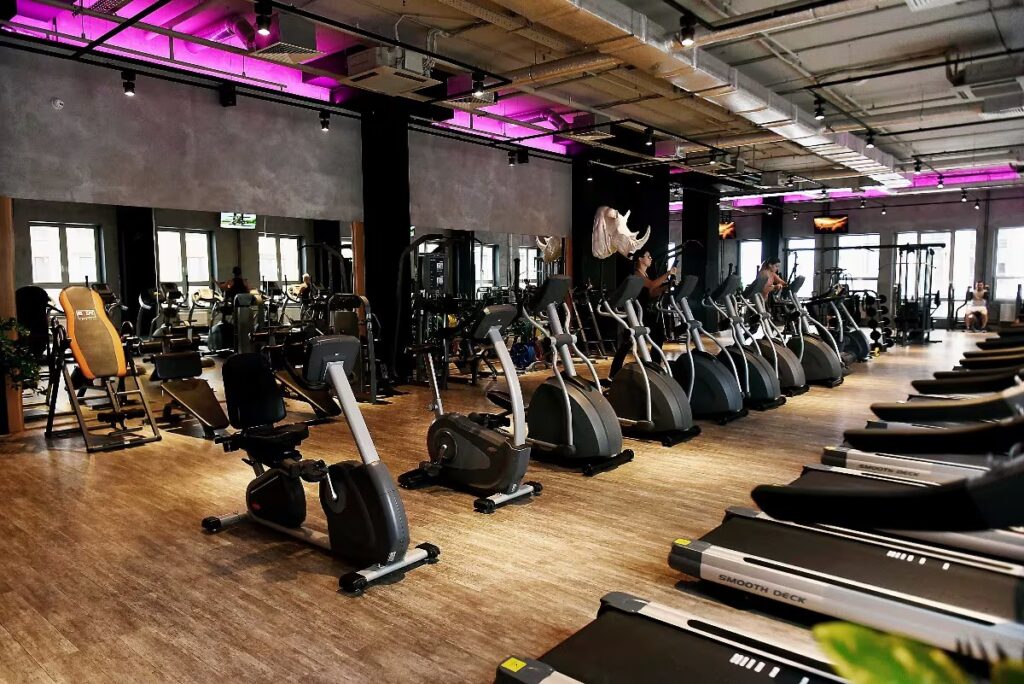
What Is a Spin Bike?
A spin bike, also known as an indoor stationary cycling bike. It simulates the experience of outdoor cycling. It has a very smooth and consistent pedaling motion with multiple adjustable resistance levels, thanks to the heavy flywheel. These resistance levels can be increased or decreased according to how intense you want the workout to be.
There are two distinctions in spin bikes and it has many benefits: chain-driven and belt-driven. Chain-driven spin bikes, as the name suggests, use a chain to connect the pedals to the flywheel. Belt-driven spin bikes, on the other hand, use a belt instead. Amongst the two, belt-driven spin bikes are quieter and require less maintenance.
Spin bikes offer a high-intensity, low-impact workout that is optimal for cardiovascular fitness and burning calories. They are also highly adjustable, with handlebars and seats that let you customize the bike according to your personal preferences.
When comparing recumbent vs spin a bike, the last one can be the better option for people who are looking for a challenging, high-intensity workout.
Spin Bike vs Recumbent Bike
When it comes to indoor cycling, two popular options are the spin bike and the recumbent bike. Both are marvelous workout tools, but they have different characteristics that may make one more suitable for your fitness goals than the other.
Let’s compare spin bike vs recumbent bike in more detail to help you choose the best option for your fitness goals.
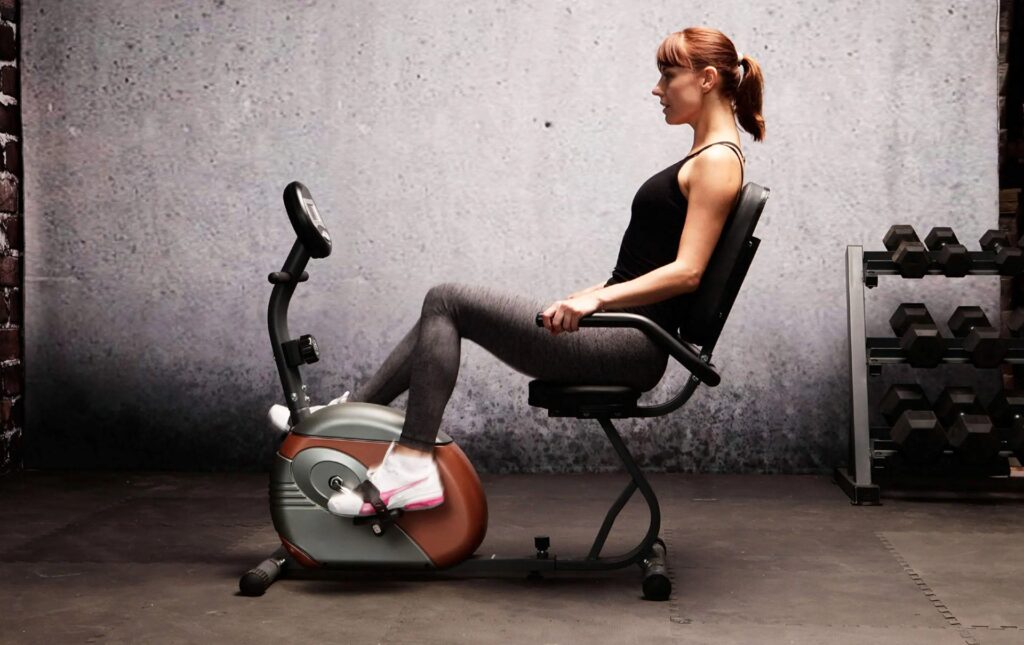
1. Workout Intensity
Spin bikes provide a high-intensive, challenging workout that can help you burn more calories and improve endurance. Recumbent bikes, on the other hand, provide a more comfortable and low-impact workout that is best for you if you’re dealing with joint issues or are just starting your fitness journey.
2. Workout Comfort
Recumbent bikes are designed with a larger seat and backrest, which provides more comfort and support for your lower back. So, they’re more comfortable than spin bikes. Spin bikes, while highly adjustable, may not be as comfortable because of the upright position that you have to maintain.
3. Impact on Joints
Recumbent bikes provide a low-impact workout that is gentle on your joints, making them a better option for those with joint issues and even for those who are recovering from an injury. Spin bikes might put more strain on your joints due to the positioning and high-intensity nature of the workout.
4. Adjustability and Customization
Spin bikes are highly adjustable, so they have the edge here. They have adjustable handlebars and seats that allow you to customize the bike to your body size and preferences. Recumbent bikes also offer some adjustability but that’s nowhere close to a spin bike’s customization.
5. Availability
Coming to the availability of the two in gyms and fitness centers, spin bikes are more common. Some gyms don’t have either, but in the ones that do, you’re more likely to find a spin bike than a recumbent bike.
Spin Bike or Recumbent: Summary
When deciding to choose between a recumbent exercise bike or a spin bike, there are several factors to consider. Both of them have some collective benefits, while one is better or worse than the other in some aspects. Spin bikes offer high-intensity workouts, and they’re greatly adjustable. They can also be uncomfortable for those with joint issues, as they require you to maintain an upright position while cycling.
Recumbent exercise bikes, on the other hand, offer a more comfortable and low-impact workout that is suitable for those with joint problems or who prefer a more relaxed cycling experience. They also have a larger seat and backrest that offers more support for your lower back. But the workouts may not be as physically challenging as on spin bikes.
Ultimately, it all will depend on your fitness goals and personal preferences. Let’s take a look at the pros and cons of recumbent exercise bikes.
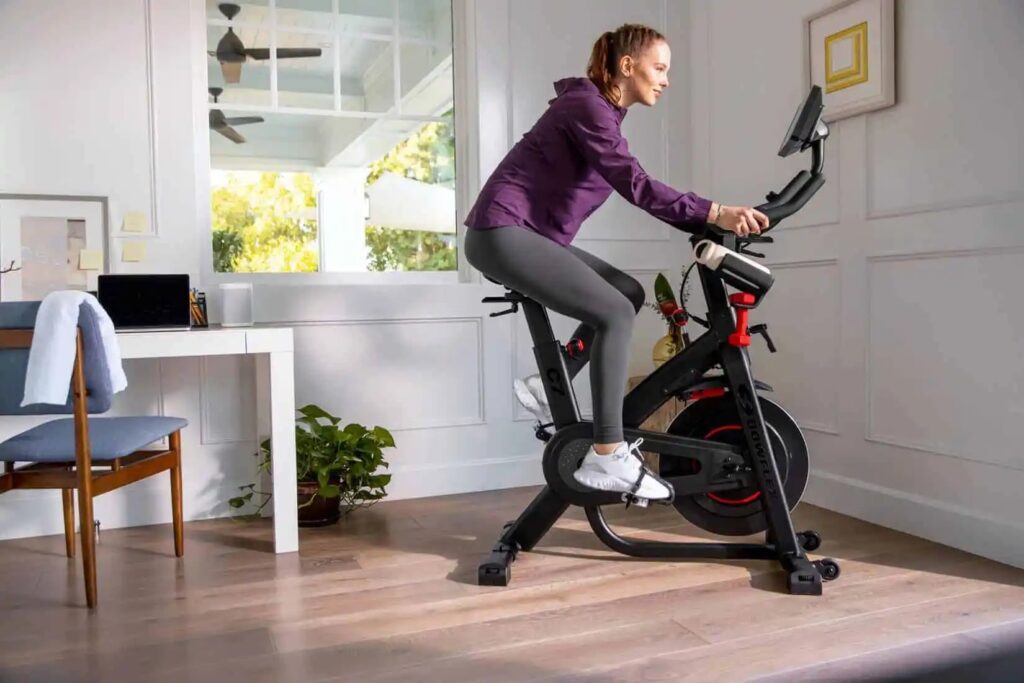
1. Pros & Cons of Recumbent Exercise Bike
Positives:
Could be better:
2. Pros & Cons of Spin Bike
Positives:
Could be better:
Recumbent vs Spin Bike: When to Use Each?
To keep things simple, use a recumbent exercise bike when you want a low-impact, comfortable workout that targets your lower body muscles. Use a spin bike when you want a high-intensity workout that improves your cardiovascular fitness. If you want to choose between the two, consider your fitness goals.
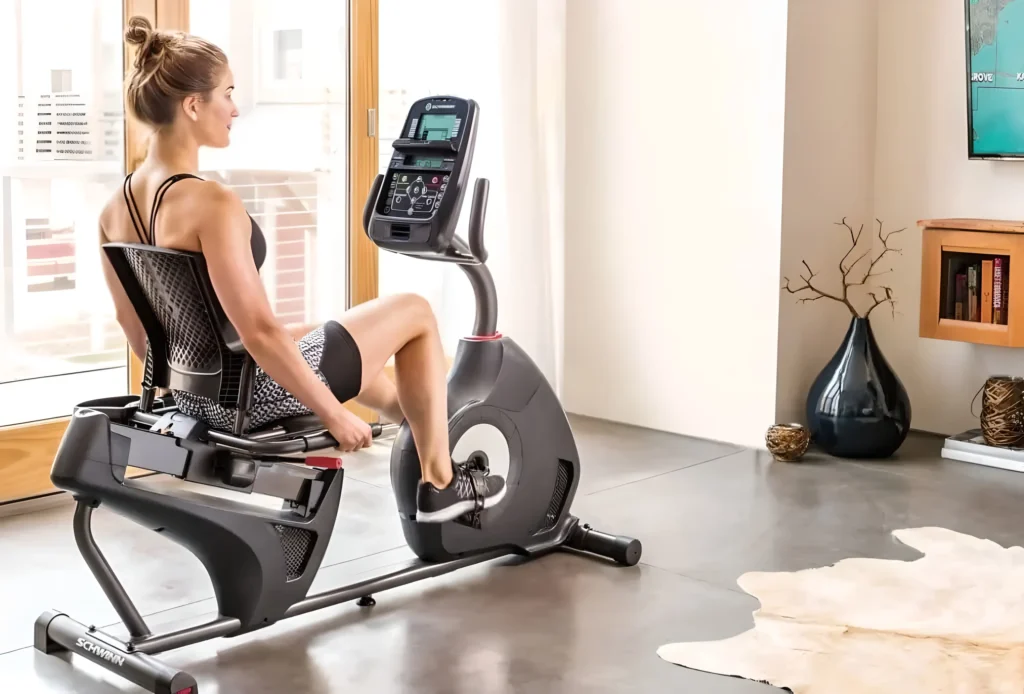
1. The Spin Bike We Recommend
The spin bike we recommend is the ProForm Carbon C7S.
The bike comes with a 30-day iFit Trial including on-demand classes, studio workouts, and live events streaming. iFit Experience brings unique interactive training sessions with an opportunity to get trainer-led workouts, track all important ride metrics, and be engaged in life-scene locations worldwide.
ProForm spin bike has a 7” touchscreen display, so you’ll be able to join the iFit online community and keep track of your performance. It’s equipped with 22 resistance levels, so you can upgrade your riding skills by setting any resistance you want to train with.
Besides the riding training itself, you’ll be able to work out your upper body with the help of a pair of 3 lb dumbbells included in the package. You’ll enjoy smooth pedaling with the inertia-enhanced flywheel and silent magnetic resistance system that bring you a natural-like ride of different intensity.
2. Recumbent Bike We Recommend
The recumbent bike we recommend is the ProForm Pro C10R.
Like all ProForm equipment, this bike also comes with the iFit 30-day Trial which provides on-bike and off-bike training sessions, a 10” touchscreen display for better interactivity, and a big padded seat you can adjust up and down to find the most comfortable position for an effective workout. It’s also designed with a built-in fan, so you can cool yourself during intensive rides. This recumbent bike has 25 levels of magnetic resistance that brings silent and friction-free pedaling.
FAQ
Are Recumbent Bikes Good for Weight Loss?
Yes, they are. They provide a low-impact cardiovascular workout that burns calories and helps you lose weight. Don’t forget to combine that with a healthy diet and regular exercise routine.
Can You Do Spinning on a Recumbent Bike?
No, spinning cannot be done on a recumbent bike as it is a specific type of high-intensity cycling workout that requires an upright spin bike. Instead, a recumbent bike can be used for low-impact cardio and strength training exercises.
Conclusion
In conclusion, choosing between a spin bike or a recumbent depends on your fitness goals, preferences, and limitations. If you know of any more pros and cons of the two, or if you want to share your opinions on both bikes, do let us know in the comment section.
Also read:
- Best Type of Exercise Bike to Rehab Knee
- Is Exercise Bike Good for Weight Loss
- Types of Exercise Bikes
- Recumbent Bike Benefits
Referenses:
- Advantages and Disadvantages of Spin Bikes // Exercise Bike Academy: https://exercisebikeacademy.com/guides/advantages-and-disadvantages-of-spin-bikes/
- Recumbent Bike Exercise // VeryWell: https://www.verywellfit.com/do-recumbent-bikes-provide-effective-workouts-4177280
Why Trust Us?
With over 20 years in Olympic weightlifting, strength training, nutrition coaching, and general fitness our team does its best to provide the audience with ultimate support and meet the needs and requirements of advanced athletes and professional lifters, as well as people who strive to open new opportunities and develop their physical capabilities with us.
By trusting the recommendations of our certified experts in coaching, nutrition, and sports training programming, as well as scientific consultants, and physiotherapists, we provide you with thorough, well-considered, and scientifically proven content. All the information given in the articles concerning workout programming, separate exercises, and athletic performance, in general, is based on verified data.
The product testing process is described in more detail here.
Author: Ihor Shymechko
Pro Olympic Weightlifter, Coach
Best Results: Snatch – 208 kg,
C&J – 240 kg
Ihor has been a professional weightlifter since 1996, boasting over two decades of competition experience. His notable achievements include clinching the European Championship in 2009 and securing a silver medal in the 105kg division at the Senior World Championships in 2011. Ihor represented his country in the 2008, 2012, and 2016 Summer Olympics. After retiring from competitive weightlifting, he transitioned to coaching, leveraging his vast experience to guide athletes who now compete on both national and international stages.



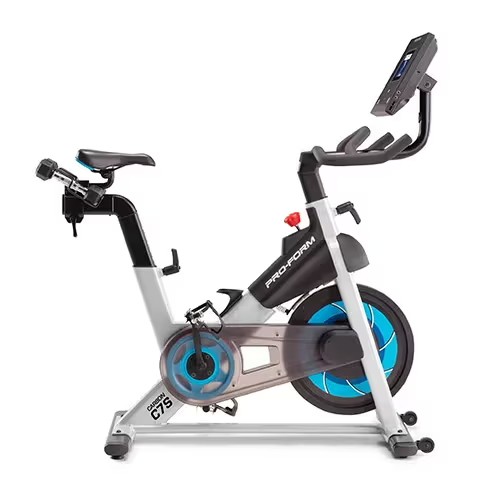
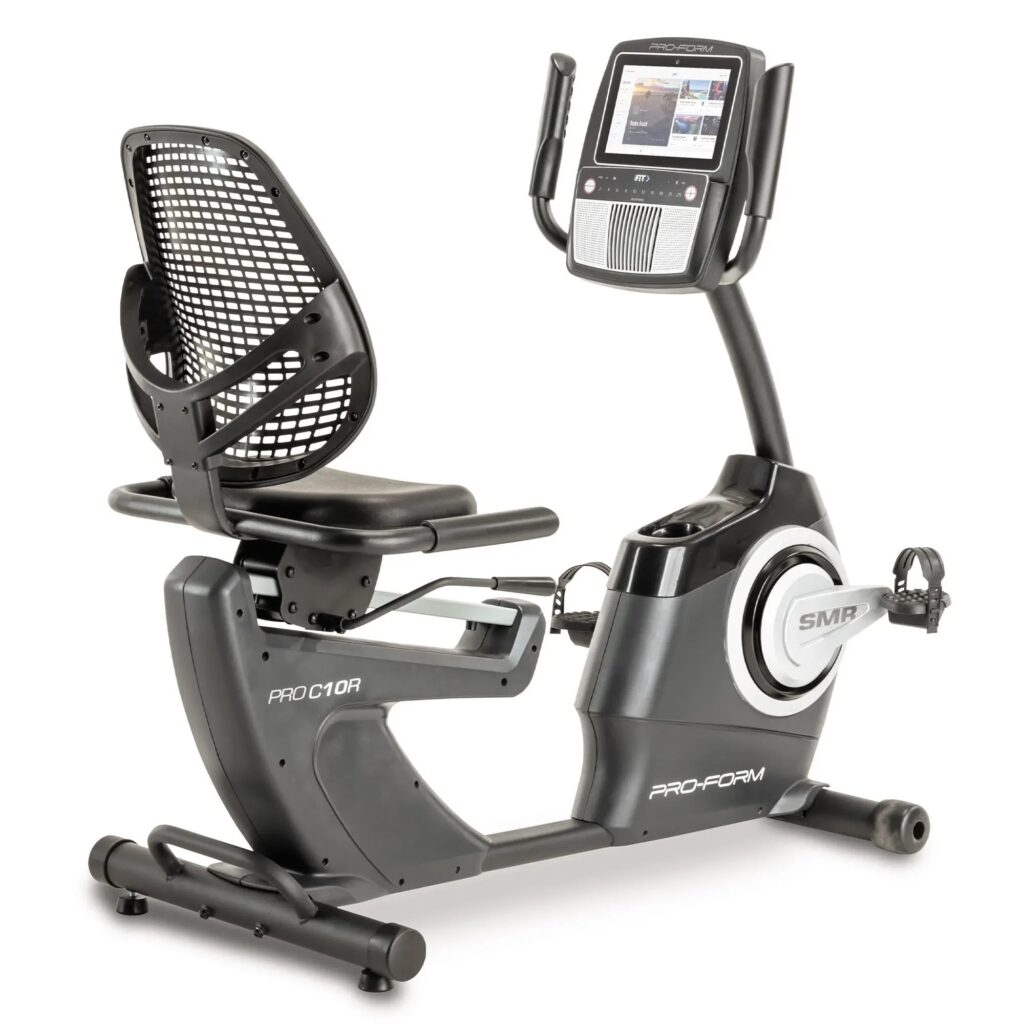
Still have questions after reading our article? Unlock your full potential by engaging with our experts and community! Don’t hesitate — leave a comment below and Ihor Shymechko will provide a personalized answer and insights to help you reach your goals.